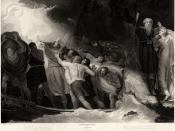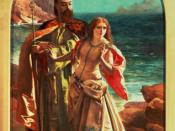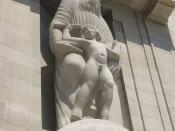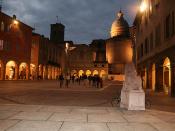Although there are no physical acts of violence in Act I, scene ii of The Tempest, Prospero's speeches and characterization are certainly filled with some extremely bitter images. After proclaiming "'Tis time (I.ii.24),"ÃÂ he sets out to explain his motive for brewing up the tempest that is the driving force of the entire play.
As he speaks about the past, Prospero is obviously recapturing every minute detail "in the dark backward and abysm of time (50)."ÃÂ All he has on his mind is vengeance: Old wounds are cruelly re-inflicted as he reflects on the bitterness of the betrayal of his "false brother (92)."ÃÂ Even "twelve year[s] since (54),"ÃÂ the pain is still vividly in his mind. In addition, Prospero is also stirring up long lost memories in Miranda's remembrance. Shakespeare cleverly weaves the plot into the audience's mind by having Prospero frequently call Miranda to attention.
Prospero speaks about Antionio most vividly, using a vast amount of imagery.
Antonio's brilliance in politics is shown as "being once perfected how to grant suits, how to deny them, who t' advance and which to trash for over-topping (79-81)."ÃÂ Prospero further complements him with a hunting image; Antonio is a political animal, "having both the key / Of officer and office. (83-84)."ÃÂ This double image illustrates how he was not only able to secure the authority entrusted to him, but he was also able to "set all hearts i'th' state to what tune pleas'd his ear (84-85)."ÃÂ Also, the recurring theme of music is mentioned. Prospero maneuvers his way into nature when he informs Miranda of "the ivy which had hid my princely trunk , / And suck'd my vendure out on't (85-86)."ÃÂ Through such use of imagery, Shakespeare conveys to the Miranda the powerful tale of wrongful seizure of authority.




